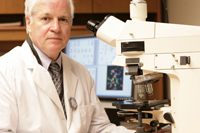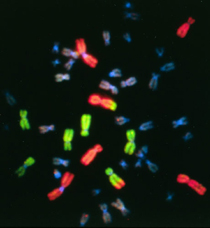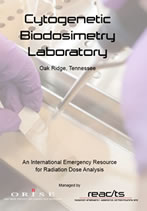
Cytogenetic Biodosimetry Laboratory

Dr. Gordon Livingston leads ORISE's Cytogenetic Biodosimetry Laboratory. Cytogenetic biodosimetry is a proven technique for calculating the radiation doses to those who have been exposed.
In establishing a Cytogenetic Biodosimetry Laboratory, the Oak Ridge Institute for Science and Education (ORISE) is helping the U.S. Department of Energy (DOE) close a critical gap in our nation's ability to respond to a mass casualty radiation incident.
Should there be an attack involving radiological or nuclear materials and affecting a large population, cytogenetic biodosimetry can be used as a proven technique for calculating the radiation doses to the victims. Knowing this information ultimately results in:
- Better treatment decisions
- Better management of valuable response resources
Cytogenetic biodosimetry uses the human body's response to radiation as the basis for accurately estimating the radiation dose. The advantages include:
- The process is standardized and scalable with relatively low costs.
- It provides a refined dose estimate for patients who need aggressive or more specialized medical care.
- It detects or confirms false positives and false negatives.
- It provides an added depth of information to decision-makers and public health officials who assess the magnitude of exposures.
ORISE's Oak Ridge, Tenn., cytogenetic biodosimetry laboratory is one of only two federally funded facilities in the United States with this capacity. The Armed Forces Radiobiology Research Institute in Bethesda, Md., is the other.
The lab will be operated as part of ORISE's Radiation Emergency Assistance Center/Training Site (REAC/TS). It is supported by DOE's National Nuclear Security Administration (NA-40) and Office of Worker Safety and Health (EH-51), as well as the U.S. Nuclear Regulatory Commission.
Dr. Gordon Livingston is leading the lab. He has conducted radiation cytogenetic research dating back to the Chernobyl accident.
How Cytogenetic Biodosimetry Works

One of the most striking and consistent effects that ionizing radiation has on human lymphocytes is the appearance of structurally abnormal chromosomes that appear in cell divisions following exposure.
When the energy associated with ionizing forms of radiation is transferred to atoms and molecules in human cells and tissues, the chromosomal DNA is damaged in proportion to the type and amount of energy that is absorbed.
Chromosomal abnormalities, such as dicentrics, can be induced by a radiation exposure. The number of dicentrics is quantified and compared to a known calibration curve in order to derive a dose estimate. This strategy for dose estimation is valid because lymphocytes express the damage regardless of whether they are in or out of the body at the time of exposure.
Read the step-by-step process or watch the process used by ORISE's cytogenetics researchers to identify and score abnormal chromosomes and nuclei. This allows them to quantify DNA damage.
Research to Improve the Technique
Our researchers will also continue to investigate ways to improve the accuracy and speed of cytogenetic analytical methods. Several methods as well as equipment improvements are underway and indicate great potential for decreasing processing time.

